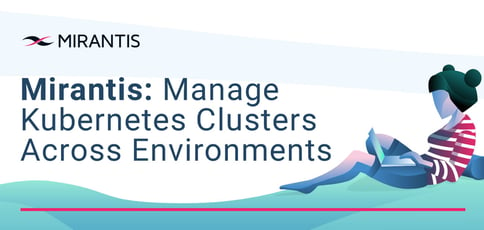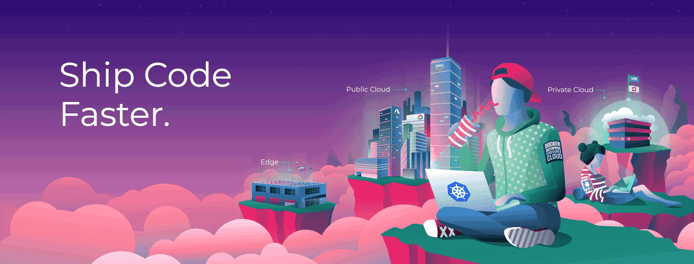
TL; DR: Amid a global pandemic and spike in demand for multicloud infrastructure services, Mirantis continues to minimize DevOps complexity for its customers. Mirantis Container Cloud orchestrates the Kubernetes stack across multiple cloud hosting and bare-metal infrastructure providers — pairing beautifully with open-source tools Lens and K0s. The recently launched product offers a consistent cloud experience that gives engineers the freedom of cloud choice without the costly obstacles. Field CTO Shaun O’Meara recounts the latest Mirantis milestones on the road map to modernize and accelerate app delivery at enterprise scale.
Every day of our lives, we’re faced with choices: ‘What time should I get up? What should I eat? Which of the 27 “high-priority” emails that showed up overnight should I address first?’ We make so many routine choices that many decisions are made on auto-pilot.
But what about the choices that aren’t so trivial? Consider the healthcare heroes tasked with making life-or-death decisions on a daily basis. Think of the engineer responsible for selecting the hosting provider and maintaining the network infrastructure on which those heroes rely. The power of choice is wonderful — and also fraught with risk.
Managing a cloud-based infrastructure comes with great examples. You have the choice of private or public cloud providers, such as Microsoft Azure or Amazon Web Services (AWS), and the continuous integration and deployment options are seemingly endless. Regardless of the path you take, container onboarding is complicated; complexity equates to a slowed speed of delivery; and the operational delay translates directly to dollars lost. The consequences of those decisions may vary based on industry and use case, but the burden of the choice is one which any IT decision-maker can relate to.

Mirantis helps clients modernize and accelerate app delivery at enterprise scale.
In a world beset by uncertainty and precarious choices, the Mirantis team boldly offers stability to cloud management customers. The cloud computing company consistently rallies against cloud complexity for its enterprise clients with management tools that allow them to ship code faster with a simpler, more secure environment. We caught up with Mirantis Field CTO Shaun O’Meara, who recaps how recent world events have impacted the market, as well as the recent product rollouts Mirantis introduced in response to ever-evolving user needs.
The Pandemic Accelerated the Move Toward Multicloud Infrastructure
One could argue the COVID-19 pandemic is blind in its victim selection — referring to both the individual people and industries impacted. From web hosting to hospitality, companies in virtually every vertical market have had to adapt and learn to thrive with limited resources and constricting circumstances. Shaun shared his customers’ shift in thinking about cloud providers and infrastructure management as an example.
“If you spoke to one of our customers 18 months ago, they would have been ‘all in’ for one cloud platform or another,” Shaun said. The mindset has since shifted: “Due to the risk factor, I can’t just be AWS; I can’t just be Azure; and I still want some on-prem,” Shaun said, portraying the thoughts of the average Mirantis client today.
Demand for multicloud infrastructures has increased, and, according to Shaun, the idea of building in-house is becoming less attractive to customers. Fortunately for those companies, Mirantis made a business of building customized, heavily modified cloud infrastructures long before it was cool to do so (a.k.a., the genesis of the Kubernetes world).
Mirantis Container Cloud Solves a Multiple-Choice Problem
Multicloud deployment is the practice of having multiple clouds to run one or more computing environments and services. Dealer’s choice: Go with a private or public cloud provider, or use both. This can benefit both IT organizations and developers by cutting costs and reducing risks associated with security, operations, and performance.
But there’s a flip side to the multicloud argument. In reality, most workloads aren’t compatible with all multicloud environments; not all workloads can run in all clouds. And, thus, the public-versus-private cloud debate lives on. Managing custom configurations requires making a series of choices.
“Choice is great, but it can lead to a lot of complexity,” Shaun said. “We want to abstract away that complexity.” Enter the Mirantis Container Cloud product (formerly known as Docker Enterprise Container Cloud).

Orchestrate the Kubernetes stack across multiple clouds and infrastructures with Mirantis.
Mirantis has addressed this multiple-choice problem by giving customers a single set of tools to deploy and manage their Kubernetes clusters on any private or public cloud or bare-metal hosted infrastructure. The Mirantis Container Cloud empowers teams to ship code faster, reduce operational overhead, and save the cost of cloud container complexity. Simplicity, security, and support remain pillars of the Mirantis service offering.
“Pick the infrastructure you want to run on,” Shaun said. “We’ll support you. Pick the tools you want to use. We’ll support you.” By layering a system of support personnel and tools atop an already powerful product offering, Mirantis continues to refine and deliver the company’s “build-operate-transfer model” — as a service. The Mirantis team builds the infrastructure, and the experts will continue to support you in managing its operations until you’re ready to fly solo.
Interested in taking advantage of this streamlined cloud experience? Get a hosted trial of Mirantis Container Cloud on Equinix Metal, or run it on your own bare metal or public cloud, for free here.
Open-Source Tools Lens and K0s Sweeten the DevOps Deal
Mirantis Container Cloud is made more compelling with the introduction of open-source tools that complement the product:
- Lens: a Kubernetes IDE that powers and connects to Container Cloud
- K0s: a highly scalable, certified Kubernetes distribution
With Lens, customers can connect to Mirantis Container Cloud from a range of tools, including open-source MCollective and Nomad, and expose one or more applications as a service. Arguably the most popular integrated development environment (IDE) for Kubernetes, Lens also provides an abstraction layer. Users can access data from many applications and receive real-time service updates.
With K0s, the out-of-the-box complexity of installing and managing a Kubernetes distribution is drastically reduced. Distributed as a single binary, K0s clusters are easily deployed to various environments. Developers can then swiftly create test environments and more confidently manage their Kubernetes clusters. Enterprise-grade security and scalability are baked in.
As a pair, open-source Lens and K0s are sweetening an already enticing DevOps deal.
Unprecedented Growth and More to Come From Mirantis
Many of us felt our freedom of choice was threatened, to say the least, during the peak pandemic season. Through it all, Mirantis harnessed customer feedback, using it to ship products that continue to address DevOps pain points. We’re proud to share such stories of perseverance and product innovation with our hosting audience.
“We’ve had a really interesting 18 months,” Shaun said in closing. “We launched four new products, merged two companies, and started addressing a wider set of use cases.”
Having already nearly doubled its sales force, Mirantis now finds itself in the unique position of having job openings that simply can’t be filled due to lack of candidates. Shaun also hinted about some upcoming partnerships that will further complement the Mirantis as-a-Service suite of offerings. Needless to say, it’s an exciting time to be growing with Mirantis — whether on staff or on the client list.
HostingAdvice.com is a free online resource that offers valuable content and comparison services to users. To keep this resource 100% free, we receive compensation from many of the offers listed on the site. Along with key review factors, this compensation may impact how and where products appear across the site (including, for example, the order in which they appear). HostingAdvice.com does not include the entire universe of available offers. Editorial opinions expressed on the site are strictly our own and are not provided, endorsed, or approved by advertisers.
Our site is committed to publishing independent, accurate content guided by strict editorial guidelines. Before articles and reviews are published on our site, they undergo a thorough review process performed by a team of independent editors and subject-matter experts to ensure the content’s accuracy, timeliness, and impartiality. Our editorial team is separate and independent of our site’s advertisers, and the opinions they express on our site are their own. To read more about our team members and their editorial backgrounds, please visit our site’s About page.

